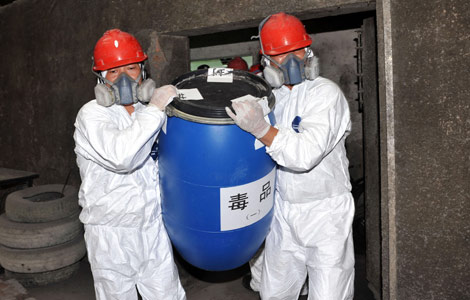
 |
| Drugs are destroyed in public on Tuesday at a garbage plant in Zhuhai, Guangdong province. More than 269 kg of drugs were destroyed at the site. YI HENG / FOR CHINA DAILY |
Guangdong police have launched a special campaign to fight drugged-driving as traffic accidents related to drug use increase.
The police will introduce more effective measures to investigate and combat drugged-driving, said Wang Junke, director of drug enforcement for the Guangdong Provincial Department of Public Security, on Monday.
Many addicts usually hallucinate after taking drugs, which could cause traffic accidents, Wang said.
The campaign was launched after a growing number of traffic accidents caused by drugged-driving were reported in the province in recent months. But Wang did not disclose the number of accidents caused by drugged-driving that have been reported in the southern province.
Police investigated two drugged-drivers in a pilot inspection campaign launched in Zhongshan city on Sunday night. Wang said more than 300 vehicles and about 350 drivers have been investigated under the campaign.
"Zhongshan has been selected in the fight against drugged-driving in Guangdong," Wang told a press conference.
The province is the first to select a pilot city to investigate and fight drugged-driving on the Chinese mainland. Should the pilot prove successful, the campaign will be expanded to other cities.
Drivers stopped are required to give a saliva sample and must also provide a urine sample if they are suspected of driving under the influence of drugs, Wang said.
Drivers found using drugs on the road will have their licenses withdrawn, Wang said.
More than 18,000 drugged-drivers, out of the total 72,000 drug users, have had their licenses cancelled in Guangdong.
Addicts lose their licenses when traffic police are told by local drug rehabilitation centers and neighborhood committees that the addicts can no longer drive because of serious addiction.
Zhu Xingzhou, a lawyer with the Foshan-based Guangdong Chanbo Law Firm, said, "Drugged-drivers can be sentenced to six months in prison and the punishment will be more serious if they cause a traffic accident."
Wang said police across Guangdong solved 8,077 drug-related cases, detaining 8,800 suspects, in the first five months of this year. This was a 12.2 percent year-on-year increase in the number of suspects detained.
Officers seized 2.4 tons of drugs, 39 guns and 191 bullets when they destroyed 103 secret drug production bases from January to May.
In 2012, police in the province cracked 21,000 drug cases and detained more than 22,000 suspects, up 11.6 percent and 10.7 percent respectively on 2011.
A total of 4.7 tons of drugs were seized and 228 underground drug production locations destroyed in 2012.
Wang said new types of drugs, including Ice, ketamine and Ecstasy, have surpassed traditional drugs in popularity among drug users in the province.
Among the new addicts detected in 2012, some 61.6 percent used modern drugs, up from 7.8 percent in 2008.
Guangdong has more than 360,000 registered drug addicts, about a sixth of the national total, and more than 40,000 new addicts are detected each year in the province, according to police.
Wang said officers across the province will strengthen the crackdown on drugged-related crimes in coming months with priority given to smashing gangs, organized crime, drug networks and channels.
















 Surviving climber safe at home
Surviving climber safe at home


![]()
